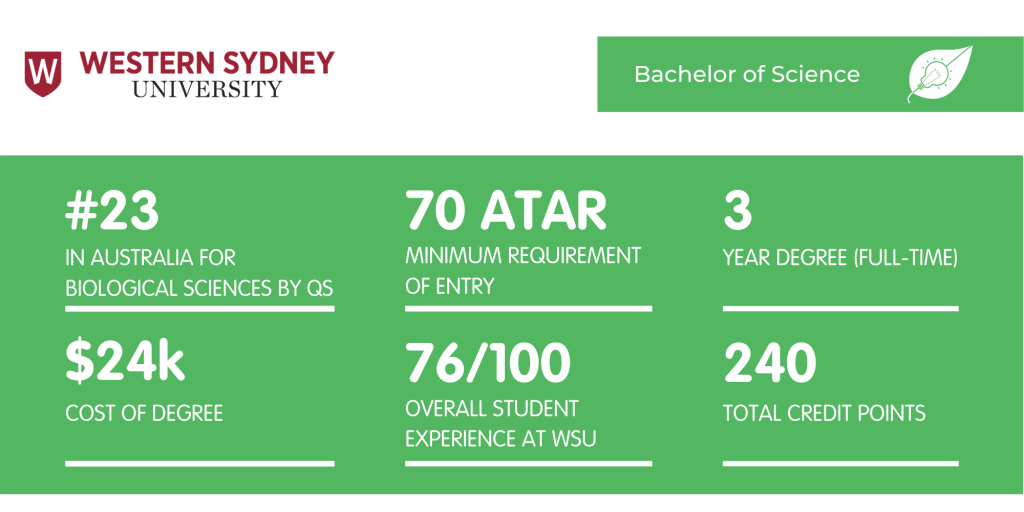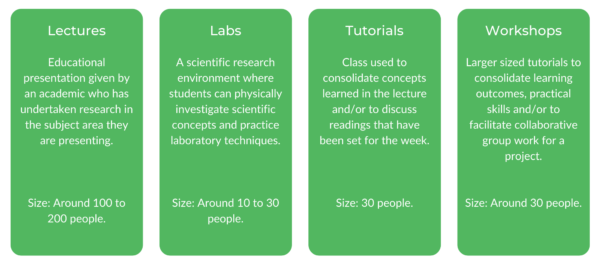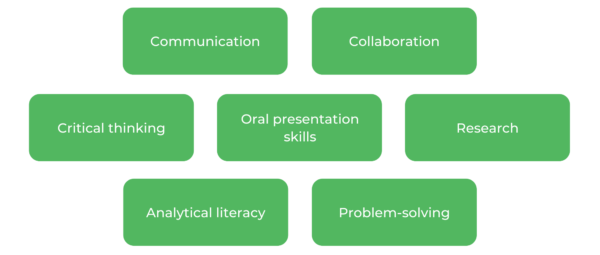Wondering whether a Bachelor of Science at WSU would be right for you?
Well, look no further because we’ve got you covered! Check out everything there is to know about the units, assessments, culture and what it’s really like to study a Bachelor of Science at WSU.
Let’s get straight into it!
What is a Bachelor of Science at WSU?
Core Units and Majors
How to Get into a Bachelor of Science at WSU
What’s the Teaching Format?
What’s the Faculty and Culture Like?
What is a Bachelor of Science at WSU?
A Bachelor of Science at WSU offers students the chance to develop an extensive understanding of the scientific environment, how the natural world works and how humans have impacted it.
As a science student at WSU, you’ll gain the fundamental skills required to investigate, analyse and participate within the natural world! You’ll develop hypotheses, test theories, observe experiments and communicate your findings using advanced scientific knowledge.
Alongside your core science units, you’ll be required to choose one major out of a diverse range of options (we’ll get to this a little later).
Can this degree be studied in conjunction with another?
Yep! There are quite a few courses that WSU offers to be studied as a double degree with their Bachelor of Science.
You could pair your science degree at WSU with:
Keep in mind that there is absolutely no requirement to study a double degree at WSU. However if you are interested in studying science in conjunction with another discipline, you can expect to have to complete a lot more work.
A double degree would increase your career flexibility, employability and it’s suitable for those having a little trouble specialising in one particular area.
Career Paths
Once you graduate as a science student at WSU, you can expect to be prepared to jump into fields like:
-
- Science-based work
- Government environmental agencies
- Quality control
- Environmental consulting laboratories
- Scientific equipment companies
- Patent work
- Hospitals
- Research institutions
- IT companies
- Medical research centres
The great thing about a science degree is that you’re not only going to develop advanced scientific skills and experience, but you’ll possess versatile knowledge that could score you a position just about anywhere (life skills!).
Core Units and Majors
A Bachelor of Science at WSU requires the completion of 240 credit points — credit points are the way in which universities measure the workload of particular subjects.
At WSU, each subject is typically 10 credit points each. This means that you’ll be completing 24 subjects all together — 4 subjects in each semester on a full-time load.
At WSU, the 240 credit point structure is broken up into 3 components. These include:
-
- 80 credit points of Core Science Units
- 80 credit points in your chosen Major
- 80 credit points of Elective Units
This means that at WSU you have quite a lot of flexibility to personalise your subjects to suit your interests and strengths.
What are the Majors?
As a Science student at WSU, you’ll be offered 14 major options to choose from. This allows you to specialise in a particular scientific area and it’s totally up to you!
The science majors that WSU offers include:
-
- Animal Science
- Applied Physics
- Biology
- Chemistry
- Data Science
- Environmental Health
- Forensic Biology
- Forensic Chemistry
- Forensic Science
- Mathematics
- Microbiology
- Nutrition and Food Science
- Sustainable Environmental Futures
- Zoology
You can take a deeper look at the majors that WSU offers underneath the title ‘Specialisations’ here!
What are the Core Units?
There are three core units that are consistent across the Bachelor of Science at WSU cohort. We’ll get into them now!
The rest of the core units that you will choose are dependent on the major that you’d like to focus on. Either way, you can take a look at Western Sydney’s Handbook.
-
- Scientific Literacy: This subject offers students the chance to learn, develop and utilise academic theories and methodologies within scientific principles. The unit will provide the foundation to scientific literacy and academic skills.
- Introductory Chemistry: This unit involves an introduction into the vast realm of chemistry. You’ll learn about basic environmental, forensic, health, medical, biological and physical sciences.
- Biodiversity: This subject provides an introduction to the way in which organisms function, acquire and assimilate resources to grow and reproduce. You’ll learn about the process of evolution and the vast diversity of organisms.
For example, if you chose to major in Biology, your first year would involve the core subjects mentioned above as well as:
-
- Essential Chemistry 2: This unit focuses on the foundational skills required to identify and understand the reactivity of molecules, chemical dynamics and the role and structure of chemicals in biological systems.
- Cell Biology: This subject offers students the chance to develop their knowledge of key biomolecules like lipids, carbohydrates, amino acids and nucleic acids. You’ll learn how these acids function to generate and store energy and you’ll gain an understanding of important biological macromolecules like DNA, membranes and proteins. So you’ll cover some pretty interesting stuff!
You’d also have to choose one out of the following:
-
- Quantitative Thinking: This topic covers basic algebra, graphs, functions, equations, probability and statistics. You’ll learn to apply these quantitative skills to scientific concepts and principles.
- Mathematics 1A: This subject offers an introduction to the theories and applications of differential calculus and complex numbers.
You’ll also get to choose one elective unit in your first year. Overall, you’ll choose 8 electives throughout your degree — this will give you a chance to pick the subjects that you’d like to know more about!
Placements
Since internships are a fantastic way to get a taste of possible professions and can add a lot to a resume, WSU offers practical experience through their Work Integrated Learning in Science unit!
This is a unit offered to second and third year Science students which provides the opportunity to undertake a short work placement in a professional company. The placement allows students to combine theoretical and practical scientific knowledge in a real world setting!
How to Get into a Bachelor of Science at WSU
To be eligible for guaranteed entry into the Bachelor of Science at WSU, you’ll need to get a minimum ATAR of 70.
If you haven’t quite gotten the required ATAR, don’t worry! There are plenty of alternative admission pathways — WSU understands that your strengths and abilities lie beyond an HSC mark.
You can have a look at the different pathways WSU has on offer here!
The College
The College is WSU’s official pathway provider for both domestic and international students. The College offers programs that combine Diplomas and Bachelors, Extended Diplomas and University Foundation Studies.
If you’re to successfully complete one of The College’s Academic Pathway Programs, you’ll be guaranteed a place at WSU!
If you’re looking to study a Bachelor of Science at WSU and didn’t quite get the ATAR, you can look into the Diploma in Science which will get you to where you want to be. Once you successfully complete the one-year Diploma, you’ll be able to go straight into the second year Bachelor degree.
Assumed Knowledge
While there aren’t any compulsory subjects required for the Bachelor of Science, WSU does expect that you have completed 2 units of English, 2 units of science and 2 units of mathematics. If you haven’t completed these HSC subjects, you can always look into choosing particular electives that can help you hone in on these skills.
Scholarships
WSU also offers a range of scholarships for potential students. You’ll just need to register your interest by submitting an application.
You can check the current scholarships that WSU has on offer here!
What’s the Teaching Format?
As a student in the Bachelor of Science course at WSU, you can expect to undertake a two-semester program. This means that your yearly studies are broken up into 2 main parts with pretty long breaks in between!
If you’re hoping to study as a full-time student, WSU recommends its students to take 4 classes each semester. That way you’ll be on track to graduate in 3 years and get straight into securing the career of your dreams!
Class Structure
You can expect each subject to be taught through lectures, tutorials, labs and workshops and the length of time you spend on each generally changes as your degree progresses. As a Science student, the majority of your classes will be quite hands-on and practical-based so it’s important that you get as involved as possible!
Lectures
Lectures at WSU will have anywhere between 100 to 200 students in the lecture theatre with you. You’ll typically have 4 lectures a week — one for each of your 4 subjects. Lectures will usually involve the lecturer standing up at the front of the theatre and teaching concepts from a presentation.
These sessions are generally for note-taking and less so group discussions. It’s important to understand what’s going on in lectures because they’ll inform future tutorials, labs and assessments.
Labs
Lectures are often followed by a practical class — in this case, it’s a laboratory session! This is where you’ll focus on experiments, collaboration with peers and testing things out yourself.
The time you’ll spend in a lab class will generally vary each week — it’ll last anywhere between 1 to 3 hours and there’ll be around 10 to 30 students attending too!
Tutorials
With around 30 students in a class, tutorials are generally far more conversational and informal than any of your other classes!
Usually it’ll involve class discussions and participation so that everyone can consolidate their knowledge and feel confident in the content. Tutorials will generally last from 1 and a half hours to 2.
Workshops
You can think of workshops as the combination of tutorials and lectures. You’ll be taught the content while physically testing it out yourself.
There’ll be around 30 students in this class and it’ll give you a chance to discuss lecture materials.
How much time do you spend on campus?
Since Science students at WSU will study 4 subjects each semester, you’ll be on campus for 20 hours plus each week. While this may seem a little daunting, it’s definitely manageable and you’ll hardly notice the time going by!
Alongside your lectures, tutorials, labs and workshops, you’ll probably want to spend a few hours at the library to individually consolidate the content that you’ve covered over the past week.
Assessments
There is a wide variety of assessment formats that you’ll undertake throughout your Bachelor of Science course. Because you’ll have the ability to personalise the course, you can also expect the assessments to be just as diverse.
“At Western Sydney, the assessments ranged from a series of small weekly quizzes, to essays, to research reports, to having to create a quality laboratory management manual and finally a final exam. You’ll also have a couple assessments that include group co-operation with an oral presentation!” — Shao Hu, Bachelor of Science Graduate at WSU
Skills That You Refine and Learn
As a Bachelor of Science student at WSU, you’ll gain a wide variety of interdisciplinary skills useful for any career path!
You can be sure to graduate with advanced communication skills since you’ll be learning how to constantly articulate ideas and theorems. You’ll also refine these skills through the speeches and oral presentations that you’ll be graded on — these are often completed in teams, which means that you’ll be collaborating and fostering relationships throughout your degree. Win win!
Critical thinking and analysis are fundamental to a Science degree — both of which you’ll learn to develop throughout your course. As you begin to understand scientific concepts and principles, you’ll notice how often you’ll be applying this knowledge to everyday life and soon this analytical thought process will feel instinctive!
Interested in the pros and cons of this degree? Check out our article here!
What’s the Faculty and Culture Like?
The Bachelor of Science course is a part of the School of Science at WSU. The faculty covers a range of scientific disciplines from agriculture, to forensic sciences, to biological science. So even if you’re interested in more than what your major offers, you have access to a faculty that knows all there is to know about the science world.
The Science Faculty and cohort are a group of intelligent and welcoming people. It’s an area where you’ll constantly feel encouraged and supported by all of the staff and students.
Societies and Clubs
With over 130 clubs and societies, WSU has such a large range of groups on offer. You might like to join a professional or social group, a religious or political club! There’s definitely something that suits every interest and it’s a great way to get to know new people.
You can find out a bit more about the clubs that WSU offers right here!
Resources
WSU offers a range of assistance for their current and future students. Whether you’d like some support academically, emotionally or financially, WSU is always ready to help out.
You can browse some of the student resources that WSU provides here!
Gemma Billington is a Content Writer at Art of Smart and an undergraduate student at the University of Technology Sydney. While studying Journalism and Social and Political Sciences, Gemma enjoys spending her time at the gym or reading about Britain’s medieval monarchy – ideally not at the same time. She currently creates and administers social media posts for Central News and writes for the student publication, The Comma. After completing her undergraduate degree, she hopes to study a Masters of Medieval History and is very excited about the prospect!






